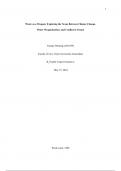1
Water as a Weapon: Exploring the Nexus Between Climate Change,
Water Weaponization, and Conflict in Yemen
Teuntje Wenting (2818359)
Faculty of Law, Vrije Universiteit Amsterdam
R_ExpS4: Expert Seminar 4
May 15, 2024
Word count: 3500
, 2
Contents
1. Introduction……………………………………………………………………………3
2. Nexus between climate change, water weaponization, and conflict…………......……5
3. Case of Yemen………..………………………………………………………………..6
4. Analyzing water weaponization in Yemen…………………….......…………………..6
4.1 Strategic weaponization………..………………………………...……7
4.2 Tactical weaponization and unintentional weaponization…..…...…….8
4.3 Instrument of psychological terror………..…………………..……….9
5. Alternative explanations for the emergence of water weaponization…….………..….9
6. Conclusion……………………………………………………………...……………11
7. Reflection as a future professional in the security domain……………..……………12
References……………………………………………………………………………………13
, 3
1. Introduction
From Ukraine to Syria, and from Nigeria to Iraq, there is an increasing frequency of
water weaponization all over the world (Cole, 2022; King & Burnell, 2017). Throughout
history, state and non-state actors have wielded control over water and its infrastructure to
demonstrate their power to oppress civilians or advance their military objectives (Gleick,
2019a). Today, accelerating climate change and associated water scarcity has increased the
strategic value of water resources and systems. This makes the practice of using water as a
weapon more effective and potentially more popular among state and non-state actors. The
Intergovernmental Panel on Climate Change (IPCC) has highlighted the severe impacts of
climate change on water availability, which in turn affects human security and conflict
dynamics (IPCC, 2023). This is in line with the following statement by Laura K. Birkman,
Head of the Climate and Security Program at The Hague Centre for Strategic Studies
(HCSS): "Climate change factors serve as an escalation ladder that can lead to a lot of
tensions going to conflict."1
As the effects of climate change become more visible, there is a growing discussion
regarding the climate change-conflict nexus (Cole, 2022; King, 2023). There is a vast amount
of literature and reports on the current conflict between Russia and Ukraine and the
emergence of the Islamic State and its use of water as a weapon (Birkman et al., 2022; Cole,
2022; De Klerk, 2023; King & Burnell, 2017). Despite that these affected regions have been
receiving much attention, various other regions impacted by climate changes remain to be
overlooked. Yemen, as one of the world’s most water-scarce countries (Van den Berg et al.,
2021), still seems an under researched area. For the past eight years, Houthi and Yemen
government forces have weaponized water, violating human rights reliant on safe and
adequate water access, including rights to life and health (Human Rights Watch [HRW],
2023). Extreme weather events, such as droughts and floods, have contributed to the water
crisis in Yemen and are projected to become more frequent and intense in coming years as a
result of climate change (The World Bank Group, 2023). With this outlook in mind, it is
crucial to broaden academic knowledge with regard to climate change and the intensification
of violent conflict in Yemen.
These developments not only have raised profound academic questions, but also have
had far-reaching societal implications as the United Nations (UN) report that over half the
population lacks access to sufficient, safe, and acceptable water for personal and domestic
1
Birkman, Laura K. "The Climate-Security Nexus: Moving from Analysis to Action" (guest
lecture, Vrije Universiteit Amsterdam, April 18, 2024)





